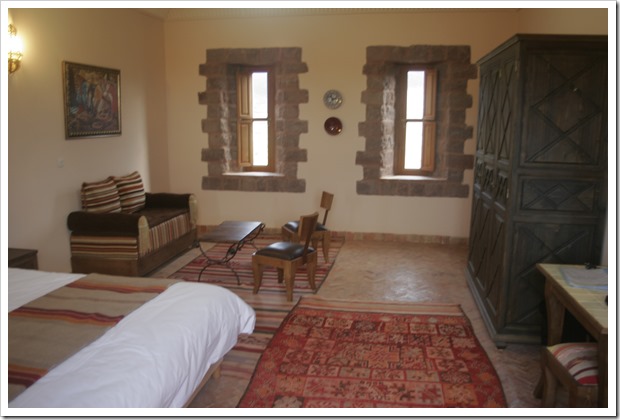Before I continue with my travelography, I think it may be necessary to provide some background on the layout of Arab style cities, as this directly relates to the events of this afternoon. Dwellings in Arab cities, of which the Marrakech Medina is typical, tend to be built in close proximity to one another, until the point is reached where it is not possible to build any closer. As the gap narrows the effect on the modes of transport is impacted. In Marrakech the long narrow passageways, which can be spanned with both arms outstretched, are often called derbs, and it is on one such derb, Derb Halfaoui, on which the Dar Charkia is located. So, how is it possible to transport luggage from such a location to the nearest point accessible by taxi. A man cart device called a carrossa, nothing more than a metal box open at the top onto which two handles and an axle are welded with two old car tyres attached. These man powered carrossas are able to negotiate the narrowest of passageways and turn the often sharp right angle turns by raising the handles above shoulder height.
Getting back to our story, At four o’clock a knock on the Dar Charkia door alerted us to the fact that the carrossa had arrived to collect our luggage. Some five minutes before, my fellow traveller had alerted me to the fact that the rain had started again. It did seem to be nothing more than a passing shower. We made our greetings to the young man powering the carrossa, sporting his Barcelona football club strip and saw his splendid vehicle with “I love Marrakech” stencilled on the side panels. Once our luggage was safely stowed our brave charioteer set off along the derb with the rain now increasing in strength. In a little under two minutes we met up with the taxi driver and his old Mercedes at the rendezvous point. Salaams exchanged with the taxi driver the luggage was transferred, at which point I duly turned to reward the young man powering our carrossa. I handed him 25 Dirhams, which as far as I was advised was 5 Dirhams over and above the normal fee for the transfer undertaken. Within seconds a full scale diplomatic incident was erupting. Our one man horse power was offended at such a miserly reward for the undertaking he had embarked on. It is raining, 25 Dirhams was never enough for such a journey. Now accompanied by another of his cohorts the pair of them rounded on me for such behaviour. Just as I was about to recount my experience just a few days before, where I was able to obtain the services of an elderly gentlemen and a younger dedicated accomplice for a mere 35 Dirhams the pair, the taxi driver stepped in and gave the young man a piece of his mind and a few yallahs to send him on his way.
We were now in the taxi, and the rain increasing in ferocity coupled with our now damp clothes had an instant effect on the internal humidity of the Mercedes, and the windows and windscreen steamed up. It then became obvious that this Mercedes was short of a few bits of factory fitted equipment. Amongst these were any capability to demist the windows. Our driver, whose name I cannot recall but for now we shall call “my favourite gear is third” drove off into the heaving mass of traffic ahead of him, wiping his windscreen and sweating brow in turn with an old cloth. Winding down my window to help with the general demisting effort, I noticed that the standard Mercedes issue door handle on my side of the car had been replaced with a piece of polished metal fixed to the door with two roughly hewn pieces of wood. And so we proceeded away from the city and south out onto the flat fertile plain, avoiding goats and sheep on and alongside the road.
When I was a young boy I remember once I think at the time of a James Bond film release, I imagine Dr. No, Esso petrol stations were giving a free gift of a see through piece of plastic with printed bullet holes on for every four gallons of petrol purchased.
The mist from the windscreen cleared only to reveal glass in such a state that it looked as though the car had indeed been unsuccessfully employed to follow Mr. Bond at some time in its long life.
Our journey continued through the town of Tahanout and some smaller outlying villages as we climbed the foothills of the Atlas Mountains until we reached our Kasbah, the castle, situated in what appears like a bowl of red fissured rock carved out of the surrounding hills. The building is a long single storey construction, flanked with castellated towers of two floors at either end.
After pleasantries and obligatory mint tea and form filling we made our way through the gardens to our room, on the first floor of the tower at the western end of the building. After being in the room for about ten minutes, we were visited by a young gentleman to take our dinner order.
After unpacking, recharging batteries, cleaning up and changing we made our way to the dining room for dinner. I think it would be best described as disappointing. In fact I remarked to my fellow traveller that she was able to rustle up a better effort back home in Wales, where only the clay pot is missing. The young men working the restaurant seemed to be lacking a bit of focus, and we put this down to the absence of the boss, away in Marrakech on business,
And so to bed, and we hope for some sunshine in the morning and a walk into the hills.

